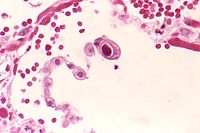
Photo from wikipedia
Cytomegalovirus (CMV) reactivation in patients with autoimmune bullous disease (AIBD) or severe drug eruption treated with immunosuppressive therapy was traditionally thought to be merely an epiphenomenon of the underlying immunosuppression.… Click to show full abstract
Cytomegalovirus (CMV) reactivation in patients with autoimmune bullous disease (AIBD) or severe drug eruption treated with immunosuppressive therapy was traditionally thought to be merely an epiphenomenon of the underlying immunosuppression. However, a detailed review of the clinical course of these patients revealed that CMV reactivation occurs upon rapid immune recovery, which is termed immune reconstitution inflammatory syndrome (IRIS), and that the timely initiation of anti-CMV therapy, when combined with maintenance doses of immunosuppressive agents, contributes to a rapid resolution of severe infectious complications thought to be refractory to conventional immunosuppressive therapies and unrelated to CMV reactivation. Thus, CMV reactivation resulting in fatal outcomes (CMV-IRIS) can be prevented by the timely detection of CMV DNA or antigens in the blood and by rapidly starting anti-CMV therapy while maintaining immunosuppressive therapy. Anti-CMV therapy is highly recommended for patients with CMV-IRIS or severe drug eruption who have risk factors for CMV reactivation resulting in fatal outcomes.
Journal Title: Pharmaceuticals
Year Published: 2022
Link to full text (if available)
Share on Social Media: Sign Up to like & get
recommendations!